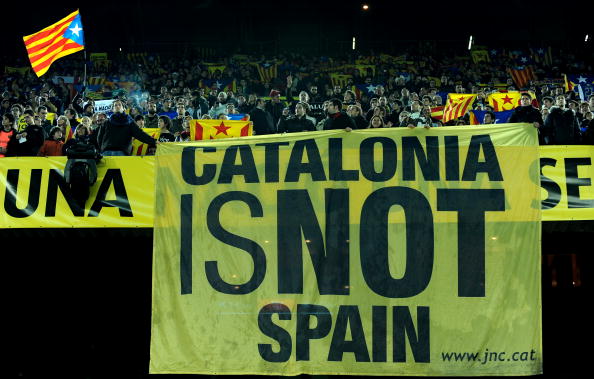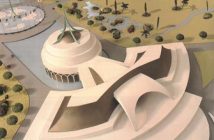
Catalonia FC Barcelona
Deprivation. Desire. Underachievement. Self-respect. Glory. These are some of the ingredients that fuel progress and development. It is they that push history makers to do what mere mortals may perceive impossible and when everything falls into place they bask in the attention; adoration and all manner of spoils that accrue from their hard work. In those moments an air of invincibility surrounds the protagonists but even they know that such periods, however prolonged and era-defining they may be, have their table reserved for that eventual and reluctantly attended date with Father Time.
FC Barcelona, the pride and symbol of Catalonia, seem to be dressed and seated at Father Time’s table. For those who’ve been living under a rock for the past 7 years, the current Barça squad has been a dominant and influential force in European and world football. It’s this squad that claimed a record 6 trophies in 2009 under the guidance of the obsessive tactician Pep Guardiola, who during his reign adorned the club’s cabinet with 14 trophies in four seasons. After the sacking of Frank Rykaard, who’d delivered the club its first UEFA Champions League title in 14 years in 2006, the football world was shocked with the appointment of the young and largely inexperience Guardiola. Little did the world know what was coming its way. The relatively young coach quickly stamped his authority by getting rid of Ronaldinho and made Lionel Messi his central player.
In a world where the size of a player is sometime overemphasized, Guardiola trusted his tiny and nimble footed ball magicians to turn every stadium they set foot on, especially their beloved and historic Camp Nou, into a Hogwarts of sorts. It’s his possession-based football that saw him lead the club to its second champions league trophy in 4 years at the Olympic Stadium at The Eternal City that is Rome against Manchester United. So dominant was Barça’s eye catching tactics that they overlapped into the Spanish national team. Perhaps as testament to the Catalans’ artistry, La Furia Roja’s chokers tag was incinerated by Andres Iniesta’s 126th minute goal to hand Spain their maiden world cup title in Johannesburg’s Soccer City Stadium. Although Barça were bundled out of the 2010 champions league by the airbus-parking and eventual winner Inter Milan, Guardiola’s team wasn’t deterred as they claimed back their crown at London’s Wembley Stadium, the site of Barça’s first European Cup triumph under the legendary Johan Cruyff’s Dream Team of which Guardiola was a member. Sir Alex Ferguson described the Barça of 2011 final, where the lynchpin that’s Xavi completed 141 of 148 passes, as the “best team” he’d ever faced. Having bagged their 3rd successive La Liga title and Messi breaking records like postcolonial leaders breaking presidential oaths taken at the advent of independence, the squad was at its acme and comparisons to the Real of 50s; Ajax and Bayern of the 70s; Milan of the late 80s and 90s became common soundbites and some went as far as suggesting it was the greatest squad ever. Amidst the regular carnival-like scenes that decorated the streets of Barcelona, some asked how long the team would maintain its magnificent trajectory. Was Catalonia’s finest timeless? The answer of their perceived invincibility lay in the 2011/12 season.
The same man who’d temporarily halted Barça march to a successive champions league final in Madrid in 2010 was brought in to try and do the same in La Liga and that man was non other than the charismatic Jose Mourinho. In his second season his much improved Real Madrid charges racked up 121 goals in 38 league matches as they became the first club to reach the 100 point mark and dash their eternal nemesis’ hopes of clinching second ever quadruple of championships. As if that wasn’t enough, Barcelona once again failed to defend their continental crown as a resolute Chelsea with stood wave after wave of assault at Camp Nou to progress to an unlikely meeting with Bayern in Munich. As holes were being poked into the infallibility that characterized Guardiola’s four years, the physically and tactically drained mentor announced that he’d vacate his position at the end of a campaign that yield the club world cup and Copa Del Rey mere consolation by that squad’s diamond standard. A sixth league title in 9 years under the guidance of the late Tito Villanova, who sadly succumbed to his battle with throat cancer, offered a bit of solace after being beaten and broken by the brute force of the blue-eyed boys of Bavaria, Bayern, in the 2012/13 champions league semi finals.
So often conquering organizations seldom pay any attention those they’ve left in their wake. Their hunger guides them as they seek to satisfy an insatiable taste for more glory. While La Blaugrana(The Team) , as Barcelona is known, was decapitating and devouring oppositions home and abroad little attention was paid to an alternative style of playing. For them their trademark slick passing was all there was but some of their opponents weren’t idly waiting to be the next experiment on which La Blaugrana’s ability to torment and humiliate teams in front of the cheering fans in the almost-always packed 99,786 capacity of the collusseum that is Camp Nou. Those clubs studied Barça’s ways while sharpening their skills in anticipation of the moment Father Time makes his appointment with their all conquering opponent. There was a period when a draw against the coastal club was wildly celebrated but today even the likes of the not-so-extraordinary Glasgow Celtic can snatch a victory against Xavi and his comrades. Perhaps it’s not so much that Barça has dropped the ball but rather that others have reduced the gulf between themselves and this renowned institution that’s “more than just a football club” as its motto proudly proclaims. The re-emergence of Atlético Madrid is a cause for celebration as it seeks to narrow the gap between the duopoly of Barça and Real and the rest of the league and possibly break it. Here’s a club that’s previously been at the receiving end of the mesmerizing Messi who netted 15 times in 20 matches against the 9 time La Liga champions, the last being in 1996. 3 seasons ago if someone had said that Atlético would be responsible for stopping Barça’s passage into its 7th consecutive semi final appearance of the champions league that person would’ve been given a full psychiciatric evaluation. However since Father Time works at his own pace and without prejudice nor favour, Los Colchoneros (The Mattressmakers) is in its first champions league final in 4 decades and it’s come at the expense of a club that amassed a staggering 160 goals in the last 6 campaigns (each consisting of 13 match days) of the best club football tournament in the world. Just as the domineering Roman Empire and glorious Egyptian civilization of old held sway in their prime and left indomitable legacies so should Barça’s finest period come full circle. La Blaugrana faithful, who between 1961 and 1990, had to witness their beloved club hoist the championship trophy aloft on a mere two occasions, 1974 and 1985, the receding golden age may seem as if it ended all too quickly but for clubs that had to make do with silver medals, if at all, as result of the tiki- taka of Camp Nou, it’s period they’re gladly waving goodbye and probably wondering how they endured those morale sapping years.
When it’s all said and done what will happen (or not happen) is all about time and action. Just as took it Chelsea half a century to win their first league title in 1955 and another 50 years to win a second one, it took time for the Catalans to end the 09/10 season with 31 wins, 6 draws and a loss. Just as it took Spain 56 world cup matches to be crowned world champions, it took time for Barça score a total of 190 in all competition of the ‘11/12 season. When the sunsets on a period of unprecedented success something less than the former has to occupy the vacancy as per time’s strict and irrevocable requirements. As only time knew that it’ll take Hull City 110 years to reach their first cup final, it’s from time’s unbiased nature we’ll find out if this indeed is FC Barcelona’s descent from what may very well be their era-defining lofty heights. The invitation has seemingly been sent and Father Time awaits Catalonia’s finest. It’s about time.






